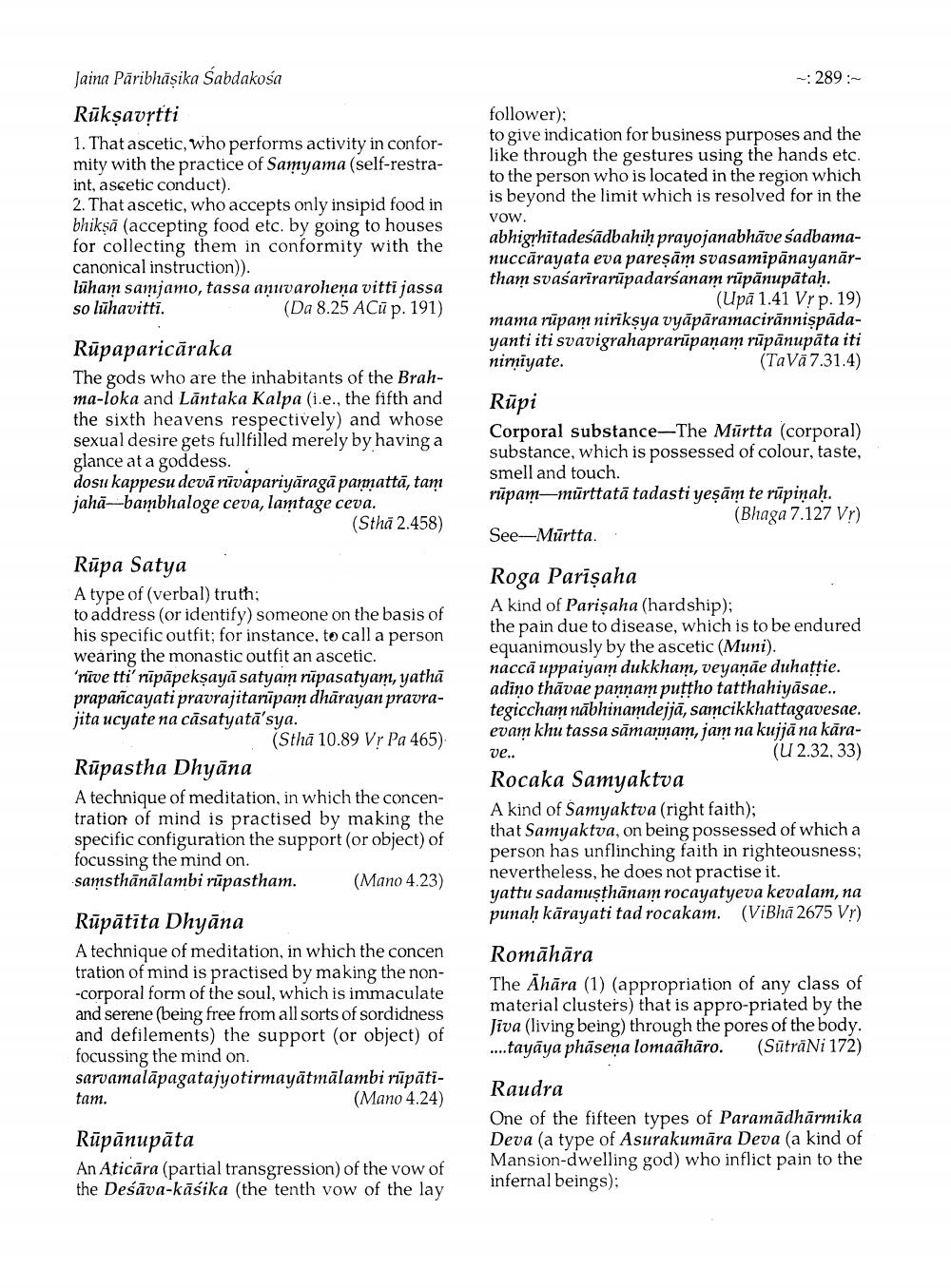________________
289:
Jaina Pāribhāșika Sabdakosa Rūkşavrtti 1. That ascetic, who performs activity in conformity with the practice of Samyama (self-restraint, ascetic conduct). 2. That ascetic, who accepts only insipid food in bhikṣā (accepting food etc. by going to houses for collecting them in conformity with the canonical instruction)). lūham samjamo, tassa anuvarohena vitti jassa so lūhavitti.
(Da 8.25 ACū p. 191)
follower); to give indication for business purposes and the like through the gestures using the hands etc. to the person who is located in the region which is beyond the limit which is resolved for in the vow. abhigrhitadesādbahih prayojanabhāve sadbamanuccārayata eva pareşām svasamipānayanartham svasarirarūpadarśanam rūpānupātaḥ.
(Upā 1.41 Vr p. 19) mama rūpam nirikşya vyāpāramacirānnispädayanti iti svavigrahaprarūpaņam rūpānupata iti nimiyate.
(Tavā 7.31.4)
Rūpaparicāraka The gods who are the inhabitants of the Brahma-loka and Lantaka Kalpa (i.e., the fifth and the sixth heavens respectively) and whose sexual desire gets fullfilled merely by having a glance at a goddess. dosu kappesu devā rīvapariyāragā pannatta, tam jahā-bambhaloge ceva, lamtage ceva.
(Stha 2.458)
Rūpi Corporal substance-The Mürtta (corporal) substance, which is possessed of colour, taste, smell and touch. rūpam-mūrttatā tadasti yeşām te rūpiņaḥ.
(Bhaga 7.127 Vr) See-Mürtta..
Ripa Satya A type of (verbal) truth; to address (or identify) someone on the basis of his specific outfit; for instance, to call a person wearing the monastic outfit an ascetic. rūve tti' rūpāpekṣayā satyam rüpasatyam, yathā prapancayati pravrajitarüpam dhārayan pravrajita ucyate na cāsatyatā'sya.
(Stha 10.89 V? Pa 465) Rūpastha Dhyāna A technique of meditation, in which the concentration of mind is practised by making the specific configuration the support (or object) of focussing the mind on. -samsthānālambi rūpastham. (Mano 4.23)
Roga Parīşaha A kind of Parişaha (hardship); the pain due to disease, which is to be endured equanimously by the ascetic (Muni). naccā uppaiyam dukkham, veyaņãe duhattie. adiņo thāvae pannam puttho tatthahiyāsae.. tegiccham nābhinamdejjā, samcikkhattagavesae. evam khu tassa sāmannam, jam na kujja na kārave..
(U 2.32, 33) Rocaka Samyaktva A kind of Samyaktva (right faith); that Samyaktva, on being possessed of which a person has unflinching faith in righteousness; nevertheless, he does not practise it. yattu sadanuşthānam rocayatyeva kevalam, na punaḥ kārayati tad rocakam. (ViBhā 2675 Vr)
Rūpātīta Dhyāna A technique of meditation, in which the concen tration of mind is practised by making the non-corporal form of the soul, which is immaculate and serene (being free from all sorts of sordidness and defilements) the support (or object) of focussing the mind on. sarvamalāpagatajyotirmayātmālambi rūpätitam.
(Mano 4.24)
Romāhāra The Ahāra (1) (appropriation of any class of material clusters) that is appro-priated by the Jiva (living being) through the pores of the body. ....tayāya phāseņa lomaāhāro. (SüträNi 172)
Rūpānupāta An Aticāra (partial transgression) of the vow of the Deśāva-kāśika (the tenth vow of the lay
Raudra One of the fifteen types of Paramādhārmika Deva (a type of Asurakumära Deva (a kind of Mansion-dwelling god) who inflict pain to the infernal beings);




